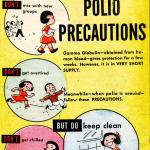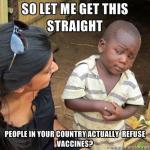It is hard to recognize the terror of infantile paralysis, polio, a highly infectious, R0 of 4 to 6, summer-time disease. It was asymptomatic for 95% of its hosts, which was good because the condition has no cure.
vaccination
Let's get the basics out of the way. This is a computational model — the lessons lie not in the numbers but in the relationships that form the numbers.
# Reprinted with permission. Dr. Singer's original article can be found here.
I've been hard on Seattle over the years.
Influenza, “the flu,” is more than a bad cold. Seasonal outbreaks yearly cause not only tremendous misery and debility but huge numbers of hospital admissions and deaths.
Anti-vaccination advocates hold many beliefs, from the thoroughly discredited allegations of Dr. Wakefield to concerns that vaccination somehow abridges religious freedom.
Since our founding in 1978, ACSH has stood for evidence-based science and health in combination with free markets and individual liberty.
I hate bumperstickers for two reasons: (1) I do not want to know every political opinion held by the people driving in front of me on I-5; and (2) They often boil down extremely complex topics into ridiculously oversimplified mottos.
An NPR account of a teenager getting vaccinated despite his parents opposition is making the rounds in the press and on s
The public sphere is inundated with malicious messages about those who are fearful of or resistant to vaccination. Low hanging fruit that includes name-calling to overtly aggressive, vicious attacks abound (e.g.












